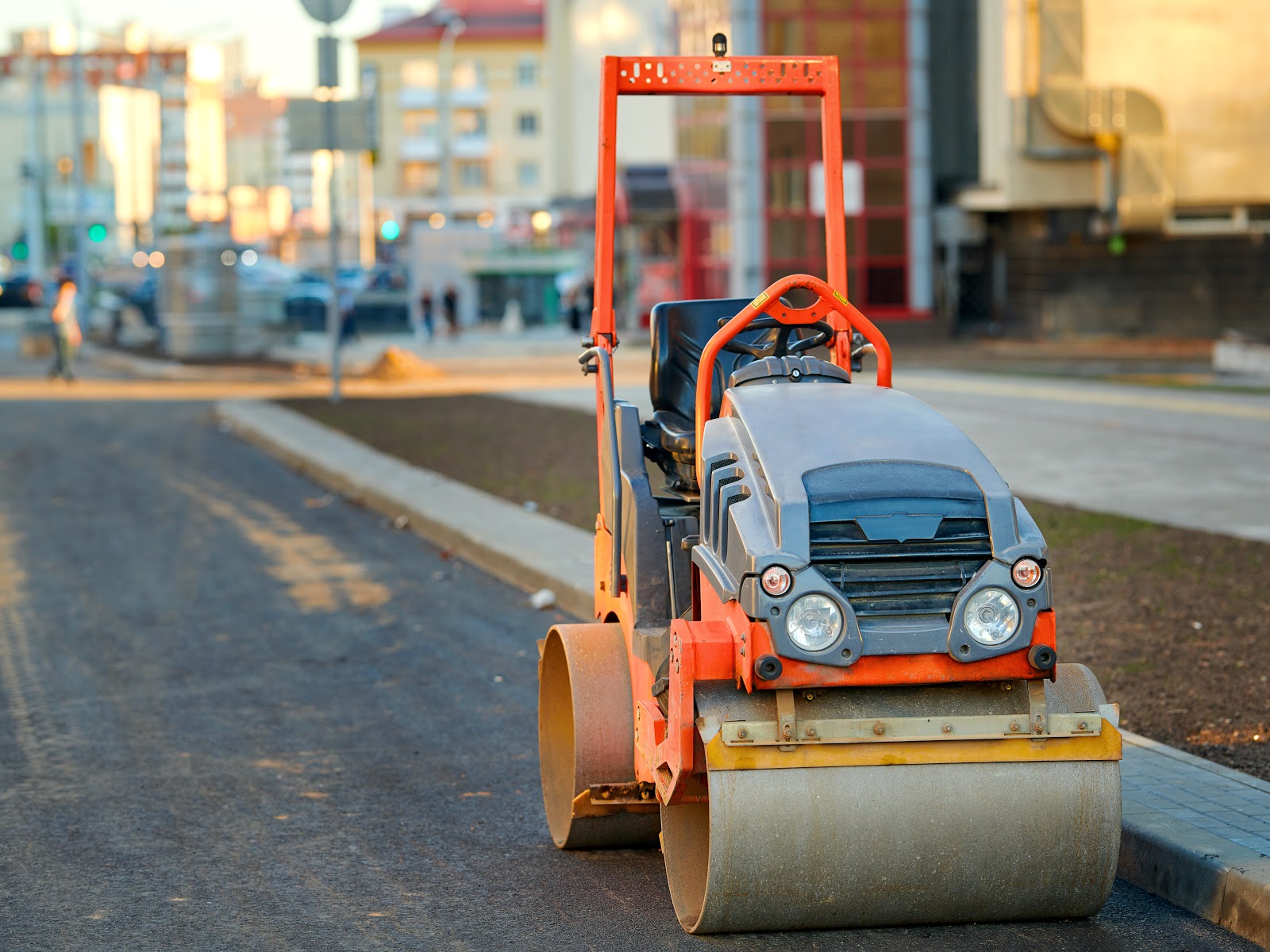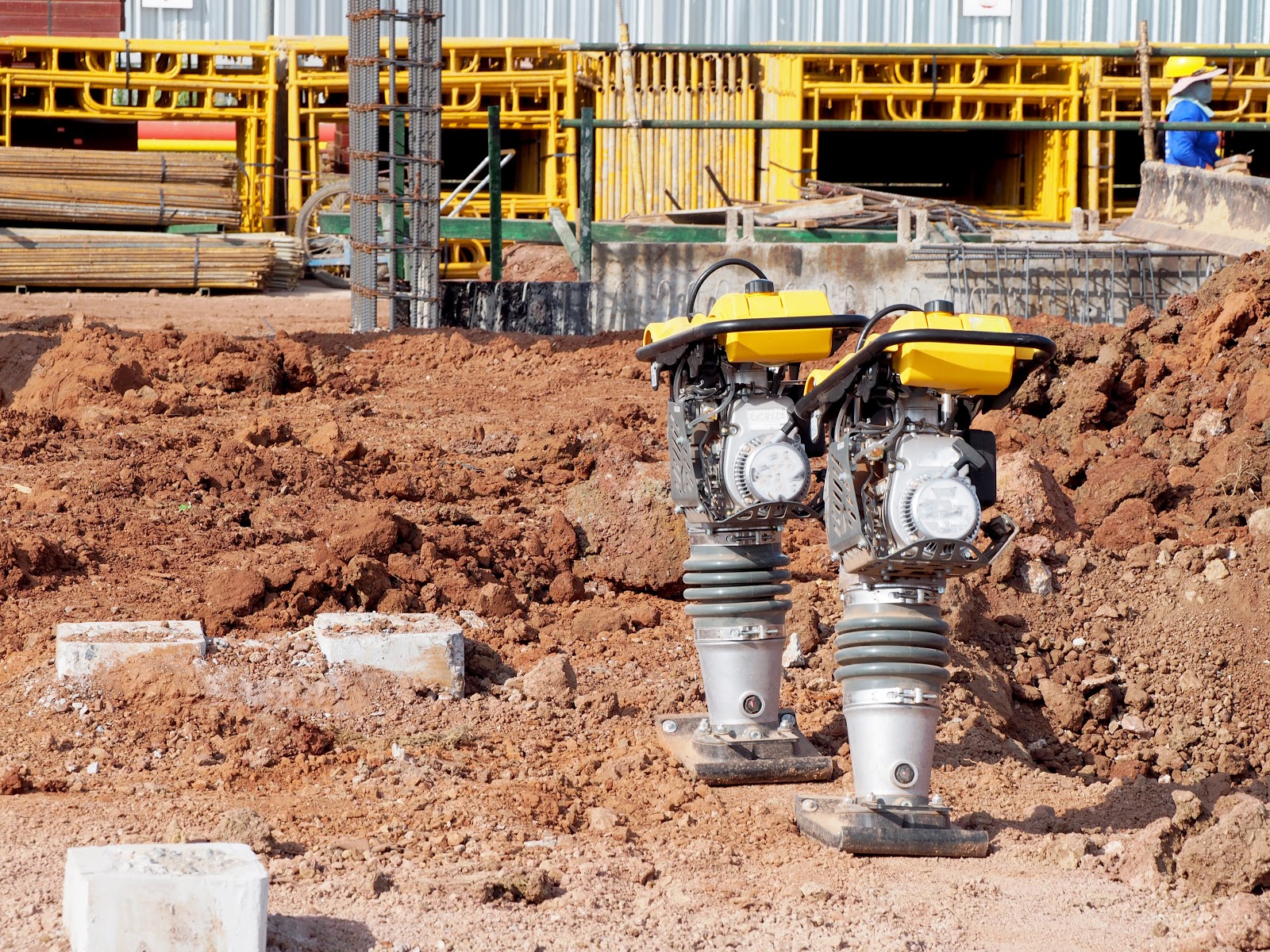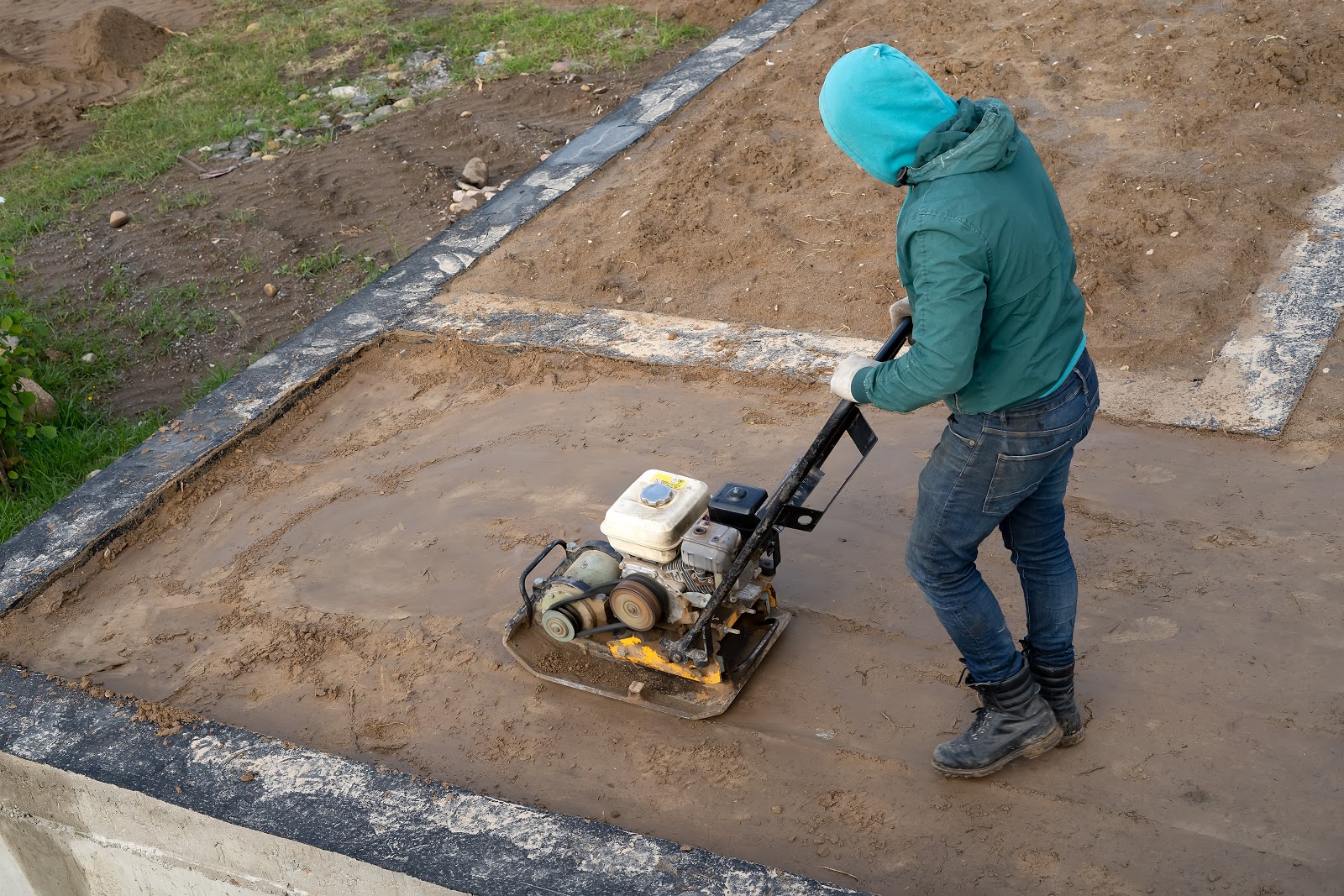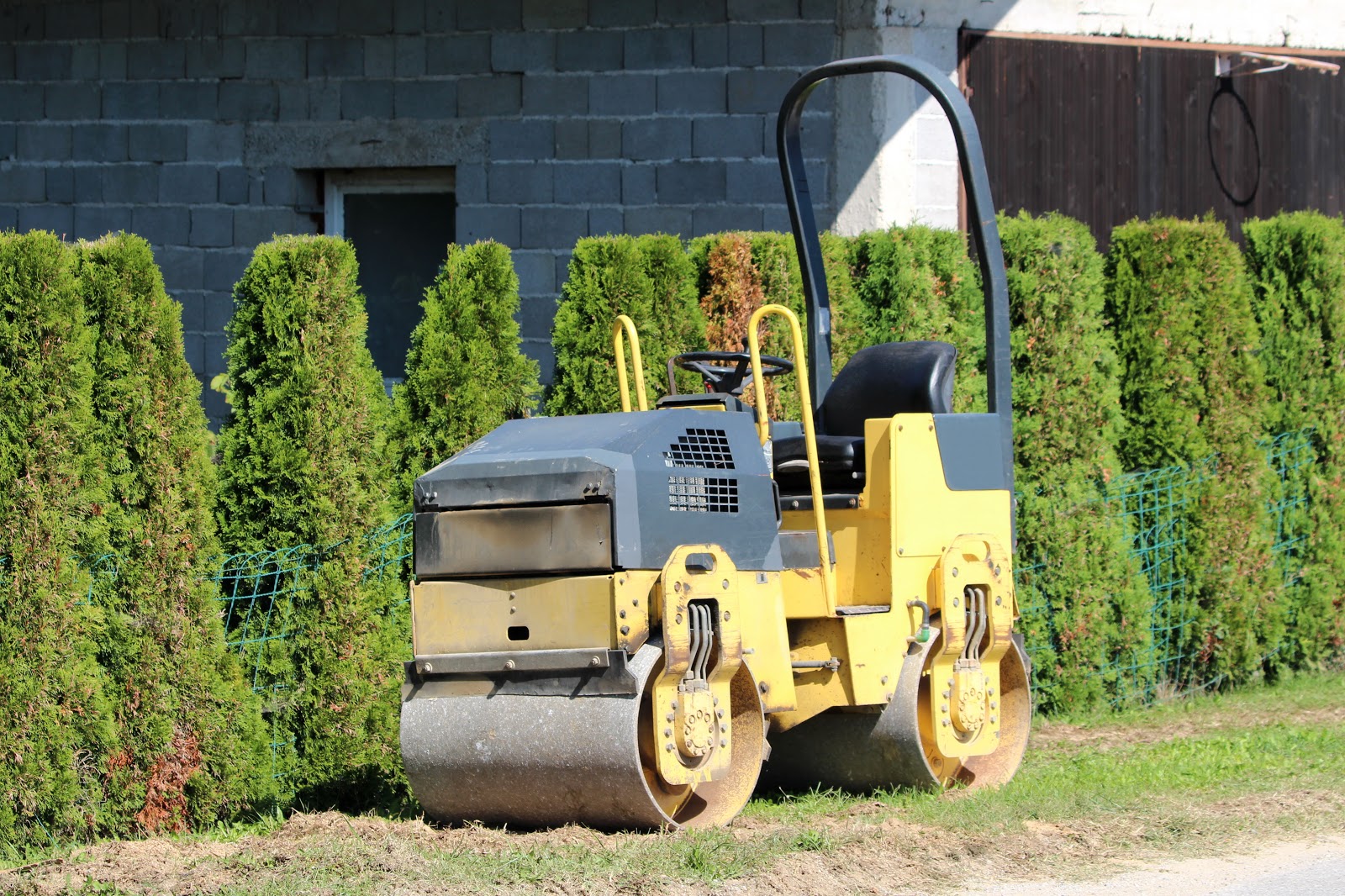Getting a smooth, compacted surface is essential for carrying out the next phase of many projects. Compacting a driveway can prevent any future cracks and deterioration, and smoothing out a layer of soil can prevent erosion due to the elements. Essentially, if you want your soil – or chosen material – to stick around and sit smooth and flat for longer, you’ll be wanting to use a compactor. But that’s not the only purpose for compaction!

What Exactly Does Compaction Do?
Compaction involves condensing the ground to make it denser. This not only makes soils and materials smoother, but it makes them stronger and better at bearing heavy weights, such as motor vehicles, buildings and other structures. As compaction compresses materials down, it presses out any gaps and air bubbles in the surface, minimising seeping and water drainage which can cause issues down the track like cracks, erosion, deterioration, weakening, etc. It will also prevent soil from slowly shrinking or sinking down where there is loose soil. Overall, it allows greater stability on surfaces, so it should be used wherever weight is going to be a factor.
Places to Use a Compactor:
- Driveway
- Pool foundation
- Backyard and frontyard transformations
- Walkways
- Retaining wall
- Building foundations
Compaction is necessary because of ‘foundation failures’
This is a common reason for building collapses. Loose soil contains little air pockets that allow water to pass through; the soil becomes damp and is further weakened shifting. Soil that is saturated with water can also allow more water to enter. As the soil contracts and expands in hot and cold conditions, so do the air pockets in the soil, which then allows more water to seep through. Over time, the problem is exacerbated until the foundation becomes unstable and unable to support the weight of anything on top. Therefore, compaction is necessary so that the soil is as tight as possible and has a maximum load-bearing capacity. But, did you know that not all compactors are suitable for the same job?
There are two different types of compaction equipment. Those suitable for light soil, and those suitable for heavy. Depending on the soil type you have, you will be better off getting either a hand-operated rammer or compactor, to a driver-operated roller machine. To hire the right equipment, read our guide before making a booking.
Compaction Rammers
The first compactor we have to discuss is the rammer. This large hand tool may not look like much, but it packs a lot of punch – literally. Rammers work by compacting soil through impact, squeezing out air and water. As they push the soil down using a strong ‘jumping’ force, they are not ideal for granular materials (where they may cause damage to the machine or even the material you are compacting). Instead, they are perfect for softer and more cohesive soils that have a moisture content of around 13%. These soils have a higher clay content and hold together firmly when wet.
This is a great machine to use in compact areas as well. Ryno Hire’s 65kg Rammer has a compact plate measuring at only 25 cm, making it perfect for narrow worksites and areas. For example, use one when you’re backfilling a trench for a water pipe running along your house or in your backyard.

Vibrating (Vibe) Plate Compactors
Next, we have vibe plate compactors. These use vibration to compress materials. If your soil is on the dryer side (less clay content) and contains granular materials, a plate compactor is definitely the way to go. Granular soil often contains silt or sand that won’t stick together as well – even when wet. This type of soil is not very cohesive and tends to crumble. However, it’s still easily compacted with this machine as the vibrations push the materials together. Using a vibe plate compactor ensures your soil is effectively and evenly compacted, and that your machinery is protected from damage.
For tighter jobs, Ryno Hire provides the 49kg vibe plate, which contains a plate measuring at only 30 cm wide. This machine is good for narrow areas or where larger pieces of equipment can’t reach. These move in a forward or backward manner, much like the rammer and can be used on granular soils or other materials like bitumen.

Smooth Wheeled Rollers
This driver-operated machine either consists of a big roller at the front and back or sometimes two smaller wheels at the back pushing a large smooth roller drum at the front. The size of this machine makes it suitable for larger-scale construction jobs rather than at-home projects. Therefore, it’s best for rolling out large areas of concrete or soil.
This particular roller works well for granular soils that have a low plasticity level – meaning that they aren’t deformed easily by force (less clay content). Unlike the next machine on our list, the smooth wheeled roller is ‘static’ as opposed to vibrating. This means it relies on the weight of the rollers to do the compacting. Typically, they are used for a more even compaction rather than a deep one. Instead of tightly packed soil, the aim here is to get a smooth, level surface. These are especially great to use when you can’t use a vibratory roller due to being near buildings, bridges, or bodies of water.
Vibratory Roller
On the other end of the spectrum, vibratory rollers are good for heavy clay, silt (fine sand or sediment that has been deposited by water, ice or wind etc), soils with high plasticity, and granular soils. The added vibration allows the soil beneath the roller to lock together and remain tightly packed. Having that extra mechanical strength of the vibration, vibratory rollers aren’t always monstrous in size. In fact, at Ryno Hire, we stock both 1.5 tonne and 2.3 tonne vibratory rollers that are compact enough to get around the backyard, but powerful enough to compress soil steadily. The 1.5 tonne machine’s roller is just under 1 metre wide, making it great for walkways and smaller backyards. The 2.3 tonne roller is just over 1.1 metres wide, making it great for medium to large backyards.

Sheepsfoot Rollers/ Padfoot Roller
This roller is similar to the previously mentioned smooth wheeled roller, however with a remarkable difference in design; it contains pads or bumps that protrude from its front wheel. These bumps are best used to compact soils with higher plasticity, like clay or silt. They also work slightly differently to a standard roller as they are used to compact soil from the bottom up – when the pads pass over the top of the soil, they “fluff up” the topsoil layer slightly while compacting the soil below. When more soil is spread over the area, the previous layer gets compacted. Therefore, these aren’t all that common for DIY projects or smaller jobs as they are typically used where great depths of soil or concrete are required, such as car parks, roads, and playgrounds.
Pneumatic Roller/ Rubber Tyres Roller
Lastly, we have the pneumatic roller. While not common for DIYs or smaller jobs, these machines are most commonly used on roads to finish rolling and sealing bitumen on the highway. These consist of pneumatic tyres that contain no tread to smooth off a surface. They are used pretty much everywhere – for kneading and sealing off footpaths, to foundations, trenches, paving, and patios. They work especially well on concrete and asphalt surfaces; however, if you’re using them in wet conditions or with wet materials, it’s a good idea to wipe down the bottom of the plate to increase efficiency. If you’re doing it on bitumen, kerosene can help stop the material from sticking to the base plate.
Take Advantage of a Combo Hire
So, that’s pretty much all the compaction machines that you should know about. Remember that it’s important to pick out the right compactor that will suit the texture and consistency of your soil. If you’re ever in doubt, refer to this guide.
If you have your ideal Ryno Hire compactor in mind, make the most of your booking by turning it into a combo hire. This is a helpful money-saving tip for those who require more than one piece of equipment over the same period of time. Learn more about our combo deals combo deals here.
As a family owned and operated business, Ryno Hire works hard to provide its customers with unbeatable service and guidance to get their project complete. To enquire about dry hiring construction machinery for your next DIY job, contact Ryno Hire today.


